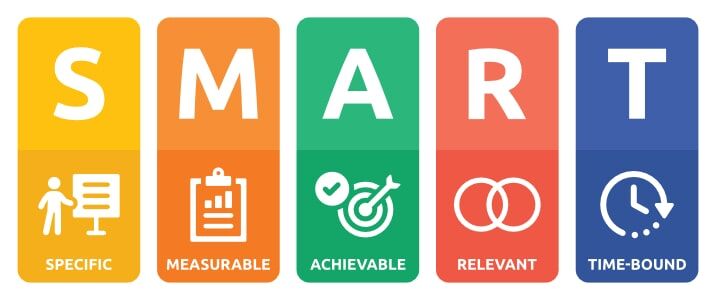Much has been said on the topic of goal setting. You can find all sorts of tactics to increase your consistency, visualize achievements, and increase your chances of success.
And sure, such information can be valuable, and goals are important. They direct our efforts and prevent us from losing focus and getting sidetracked.
The problem is that many people go about setting goals poorly and fail in the end.
To prevent that from happening to you, we have put together this short guide on smart fitness goals, explaining what makes a goal effective and how to set it for yourself.
The Concept of SMART Goals
Whether you are a seasoned fitness enthusiast or a beginner, your workout routine could take some inspiration from the business sector.
In particular, the concept of goal setting - precisely, setting SMART goals for fitness:
- Specific
- Measurable
- Attainable
- Relevant
- Time-bound
What are SMART goals in fitness?
SMART goals provide a systematic and mindful pathway toward an objective. Consider this analogy: as a business owner, I want to earn more money.
This does not include any context on how to get there and how much money is "more money." In other words, it is not a solid plan for success.
Similarly, a fitness goal to "become healthier" also does not provide a practical framework. Using SMART could redefine this fitness goal: Over the next three months, I aim to increase my average daily step count from 8,000 to 10,000 steps.
1. Make it Specific
What trips many people up is the lack of clarity. A widespread example of a fitness goal: "I want to exercise more."
Do you see the problem with this goal? It needs to be more specific and push you to act. To make it specific, you need to get clear on the following:
- What type of exercise you want to do
- How often you want to train
- Where you want to train
- Who you want to train with
A better version of this example of a SMART fitness goal would be: "I want to lift weights in my local gym with my friend John on Monday, Wednesday, and Friday evenings."
2. Make it Measurable
A goal's measurability is a crucial factor. With it, you will always know if you are on the right track and progressing well. To make a goal measurable, it is good to be clear on several things, including:
- How will I know if I have reached my goal?
- What are my indicators of progress?
- Can I break it down into weekly or monthly objectives?
For example, to borrow the goal from the previous point. We can transform it into this: "I want to lift weights in my local gym with my friend John on Monday, Wednesday, and Friday evenings. I want to lose twenty pounds in the next four months."
You have a clear objective now, and you can break it down into weekly mini-goals: lose a pound or so each week.
3. Make it Attainable
We are all for ambitious goals, but part of a smart goal is to be attainable. For example, "I want to improve my bench press by 50 pounds in the next six months."
Depending on your current strength, this could be an achievable goal. Seeing yourself making progress can be incredibly motivating to keep pushing and reach it eventually.
In contrast, "I want to bench press 50 more pounds and lose 20 pounds of fat in the next four months." is an example of an unrealistic goal. Even worse, this goal scatters your focus and has you chasing opposing objectives.
4. Make it Relevant
The next aspect of setting smart goals is to think, "How relevant is this objective for me?"
Each goal you set should serve to fulfill a role in a larger and broader plan or view of what you want your life to be.
For instance, your ultimate goal might be to be strong and muscular. In that case, you should pick goals that help you get closer to your vision.
In contrast, getting sidetracked with goals that do not move the needle only serves to scatter your attention.
When setting goals, always consider their role in your life and what each will accomplish once you reach it. Would it serve as a stepping stone or keep you away from your ultimate desire?
5. Make it Time-Bound
The final aspect of effective goal setting is to add a deadline. Without one, it is easy to lose focus and motivation and give up after a while.
Knowing that you have a specific amount of time to achieve a fitness goal makes it a lot clearer. This helps keep you motivated and allows you to stay more focused.
Consider these two examples of fitness goals:
- "I want to lose twenty pounds of fat."
- "I want to lose twenty pounds of fat in the next four months."
Which of the two would you say is better at keeping you focused and motivated? If you are like most, the second goal probably caught your attention.
Maintaining Accountability: A key to Fitness Success
Congratulations on your progress so far! You have defined your objectives and committed to a SMART goal, fueling the motivation to push yourself beyond your comfort zone.

Great job! But wait, here comes the challenging part.
Accountability is the key to achieving the goals you set out for yourself. Remember, achieving your smart fitness goals entails more hard work than you might anticipate. Changing your habits can be intense and uncomfortable, but rest assured, it is worth it.
Now, there are different ways how you can track your progress toward meeting your fitness goals:
- Share your goals with friends or family. Doing so creates a support system that will check in on your progress.
- Dedicate specific time slots in your calendar for fitness. Planning when and where to exercise will allow you to focus on your fitness journey.
- Join a gym, an exercise class, or a social group. These communities provide positive peer pressure and a built-in support system to keep you on track.
- If joining a physical gym is not feasible, consider virtual fitness groups like those on Facebook.
- Utilize fitness apps to document your efforts and progress. Keeping track of your strides will help maintain your momentum.
- And most importantly, take the time to celebrate each milestone! Pat yourself on the back for every victory achieved.
If you need more certainty about where to begin or need professional guidance, feel free to consult a fitness expert, such as a personal trainer.
They can help you establish a SMART goal, devise a plan to reach it and provide that little extra push you might need along the way. In our other blog article, you can also read more about how to develop a fitness mindset.
Never skip a Workout with SMART Goals
You probably already know our slogan, "Never skip a workout." Maintaining your fitness routine, even while traveling, is crucial to achieving your SMART goal. You do not want to skip workouts, especially when you are still at the beginning of your fitness journey. This is where HotelGyms.com comes in handy.
Our GymFactor assists you in finding hotels equipped with gyms that offer the workout equipment you need. This makes keeping up with your workouts much easier and simplifies staying on track.
Your training may vary slightly, but the key is to keep active. It is essential to maintain momentum, as getting back on track after each vacation or business trip can be significantly more challenging.

